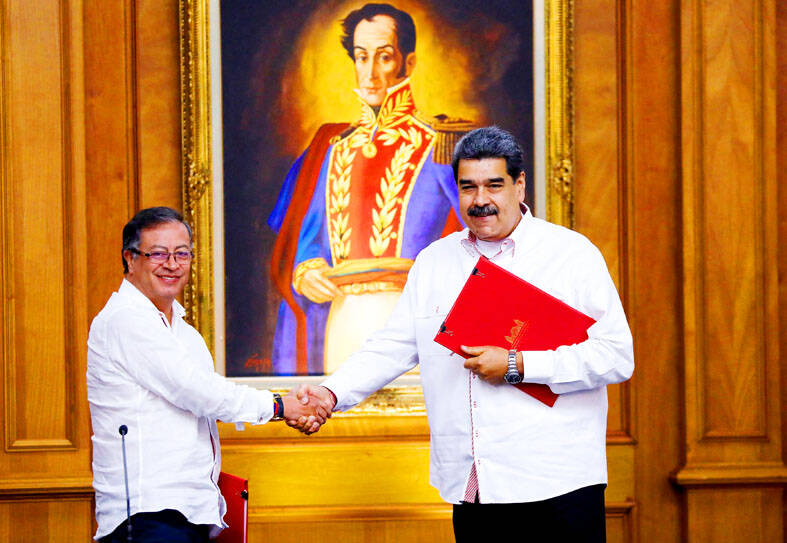Colombian President Gustavo Petro on Tuesday met with Venezuelan President Nicolas Maduro in the first talks at the presidential level since the neighbors re-established diplomatic ties after a three-year break.
The meeting in Caracas of the two leftist leaders marked a watershed warming between the once-estranged neighbors.
Petro, a former M-19 leftist insurgent who was sworn in as Colombia’s first leftist president in August, called for Venezuela to be brought back into a regional trade alliance and a human rights system.

Photo: Reuters
“We want to invite Chile, Ecuador, Bolivia and Peru to accept the reintegration of Venezuela in the Andean Community as a member with full powers,” Petro said after meeting Maduro at the Miraflores Palace.
Venezuela left the regional trade bloc in 2006.
Petro also called for Venezuela to be pulled back into the human rights convention of the Organization of American States, a hemispheric alliance.
Maduro said he was “very receptive” to the idea.
Venezuela severed diplomatic relations in 2019 after increasingly strained ties with Petro’s predecessors Juan Manuel Santos and conservative Ivan Duque — who Maduro even accused of orchestrating plans to assassinate him.
The final straw came when Duque backed Venezuelan opposition leader Juan Guaido — recognized by dozens of countries as the victor in 2018 elections claimed by Maduro.
It was the first visit by a Colombian president to Venezuela’s capital since 2013.
Since Petro succeeded Duque in August, Colombia’s first-ever left-wing president has moved to mend relations with Venezuela’s government.
Caracas and Bogota formally re-established diplomatic relations on Aug. 29 by sending ambassadors to each other’s capitals.
Guaido on Tuesday criticized Petro’s decision “to visit the dictator Maduro ... and to call him ‘president.’”
It was an “action that could dangerously normalize human rights violations ... and the worst migration crisis in the world,” he wrote on Twitter.
More than 7 million Venezuelans have left their country since 2014, according to the UN.
About 2.5 million find themselves in Colombia, as part of an open-door policy followed under Duque, in support of Guaido.
Maduro, after the talks, called for “new steps toward a total opening” of the two neighbors’ shared 2,200km border, a frontier that has been infested with armed groups fighting over lucrative drug resources and routes.
In September, Colombia and Venezuela reopened the border to vehicles transporting goods — considered the first step toward resuming commercial relations worth about US$7.2 billion in 2008, but only US$400 million last year.

Thousands gathered across New Zealand yesterday to celebrate the signing of the country’s founding document and some called for an end to government policies that critics say erode the rights promised to the indigenous Maori population. As the sun rose on the dawn service at Waitangi where the Treaty of Waitangi was first signed between the British Crown and Maori chiefs in 1840, some community leaders called on the government to honor promises made 185 years ago. The call was repeated at peaceful rallies that drew several hundred people later in the day. “This government is attacking tangata whenua [indigenous people] on all

The administration of US President Donald Trump has appointed to serve as the top public diplomacy official a former speech writer for Trump with a history of doubts over US foreign policy toward Taiwan and inflammatory comments on women and minorities, at one point saying that "competent white men must be in charge." Darren Beattie has been named the acting undersecretary for public diplomacy and public affairs, a senior US Department of State official said, a role that determines the tone of the US' public messaging in the world. Beattie requires US Senate confirmation to serve on a permanent basis. "Thanks to

UNDAUNTED: Panama would not renew an agreement to participate in Beijing’s Belt and Road project, its president said, proposing technical-level talks with the US US Secretary of State Marco Rubio on Sunday threatened action against Panama without immediate changes to reduce Chinese influence on the canal, but the country’s leader insisted he was not afraid of a US invasion and offered talks. On his first trip overseas as the top US diplomat, Rubio took a guided tour of the canal, accompanied by its Panamanian administrator as a South Korean-affiliated oil tanker and Marshall Islands-flagged cargo ship passed through the vital link between the Atlantic and Pacific oceans. However, Rubio was said to have had a firmer message in private, telling Panama that US President Donald Trump

‘IMPOSSIBLE’: The authors of the study, which was published in an environment journal, said that the findings appeared grim, but that honesty is necessary for change Holding long-term global warming to 2°C — the fallback target of the Paris climate accord — is now “impossible,” according to a new analysis published by leading scientists. Led by renowned climatologist James Hansen, the paper appears in the journal Environment: Science and Policy for Sustainable Development and concludes that Earth’s climate is more sensitive to rising greenhouse gas emissions than previously thought. Compounding the crisis, Hansen and colleagues argued, is a recent decline in sunlight-blocking aerosol pollution from the shipping industry, which had been mitigating some of the warming. An ambitious climate change scenario outlined by the UN’s climate